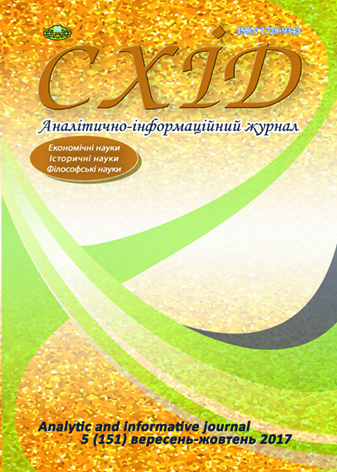The Fourth Wave. New industrialization. Altermodern: Cultural Explication of Concepts
DOI:
https://doi.org/10.21847/1728-9343.2017.5(151).117402Keywords:
subject, "The Fourth Wave", "New industrialization", "Altermodern", artAbstract
The article is devoted to the culturological analysis of the new model of the subject in the twenty first century. The methodology of work is based on the wave theory of social development. Modern society enters the state of the "fourth wave". The fourth wave comes in place of the agrarian, industrial and informational societies. This wave is called "new Industrialization" in contemporary economic context. The modern economy needs the revival of the industrial sector with the support of the national state. New industrialization is countering the global control and fragmentation of the world. The national state is changing its concept from unitary to glocal and multi-polar. Consciousness of citizens should also change. The subject of the fourth wave is a cultural nomad. He makes travels to the global world and switches cultural codes in different contexts. The term "altermodern" is the word of curatorial practice of "zero" (2000s). It means the nomadic consciousness, the ability to cultural wanderings. Nomadic consciousness is based on the model of transculture.
Trans-national and trans-cultural view is a synchronization in the human minds of different cultural worlds. Man is at the point of their collision, belongs to all the worlds and does not apply to any one. It accumulates in its consciousness projections of different cultures, their possible alternatives and development. Nomadism, transculture and altermodern - is the gap between globalization and antiglobalism. Globalism causes unification of cultures. Anti-globalism leads to a revenge of fundamentalism and ethnic isolation. Nomadic consciousness of the altmodern balances between the universal and particular principles of human existence.
Opposition to ideology is a distinctive feature of transcultural altmodern. The fourth wave is characterized by total radicalization of the world as a result of the revival of the neoliberalism of the right-wing dictatorships on the territory of the Third World countries. "The doctrine of shock" is the source of the formation of neo-totalitarianism. Art liberates him. Psychoanalysis is a means of liberation from ideologies. The procedure for dismissal is based on art therapy in the aesthetic cluster. Altermodern is an era of increasing role of artists in shaping the consciousness of a cultural subject. Art-galleries of the world use techniques of psychoanalytic work with the public. They provide rearrangement of the subject in the direction of an open dynamic consciousness without boundaries and prejudices.Downloads
References
Bourriaud, N. (2009), The Radicant, Tate Britain, 3 februari t/m 26 april. - Sternberg Press, available at: www.metropolism.org/magazine/2009-no1/een-archipel-van-lokale-reacties/
Fabbrini, Ricardo Nascimento (2012), A altermodernidade de Nicolas Bourriaud, Trans/Form/Ação [online], vol.35, n.3, 259-266. DOI: 10.1590/S0101-31732012000300014.
Marcel, Gabriel (2010), Homo Viator: Introduction to the Metaphysic of Hope [1 edition], St. Augustines Press, 312 p.
Ricker, Ariel (July 12, 2013), Homo Viator & Formalized Social Rejections DOI: 10.2139/ssrn.2292936
Bauman, Zygmunt (1997), Modernity and Clarity In: Luthe H.O., Wiedenmann R.E. (eds) Ambivalenz, VS Verlag für Sozialwissenschaften. DOI: 10.1007/978-3-322-91433-0_5
Toffler, Alvin & Toffler, Heidi (2000), Global Gladiators Challenge the Power of Nations, New Perspectives Quarterly. № 17. 26-27. DOI: 10.1111/0893-7850.00233
Herzogenraf, Bernd (2005), "Highway to Nowhere": Lynch and Lacan, Cinema and Cultural Pathology [translat]. In: Russian Anthropological School. Proceedings. Issue. 3, RGGU, Moscow Available at: http://euristem.livejournal.com/41151.html.
Deleuze, Gilles (2007). Anti-Oedipus: Capitalism and schizophrenia [translat], U-Factoria, Ekaterinburg, 672 p. (rus).
Epstein, Mikhail (2004), The Gap Sign: On the Future of the Humanities, New literary review, Moscow, 864 p. (rus).
Diamond, Larry (May 22, 2011). A Fourth Wave or False Start? Democracy After the Arab Spring. Foreign Affairs. Available at: https://www.foreignaffairs.com/articles/middle-east/2011-05-22/fourth-wave-or-false-start
Downloads
Published
How to Cite
Issue
Section
License
Copyright (c) 2017 Yevheniia Bilchenko

This work is licensed under a Creative Commons Attribution-NonCommercial-NoDerivatives 4.0 International License.
1. Authors bear responsibility for the accuracy of facts, quotations, numbers and names used.
2. Manuscripts are not sent back.
3. The publisher does not always agree with the authors' opinion.
4. The authors reserve the right to authorship of the work and pass the first publication right of this work to the journal under the terms of a Creative Commons Attribution-NonCommercial-NoDerivatives 4.0 International License. This license allows others to distribute (copy) the published work for non-commercial purposes, provided there is mandatory attribution to its authors and a link to the first publication in our journal.
5. The authors have the right to conclude separate supplement agreements that relate to non-exclusive work distribution in the form in which it has been published by the journal (for example, to upload the work to the online storage of the journal or publish it as part of a monograph), provided that the reference to the first publication of the work in this journal is included.

